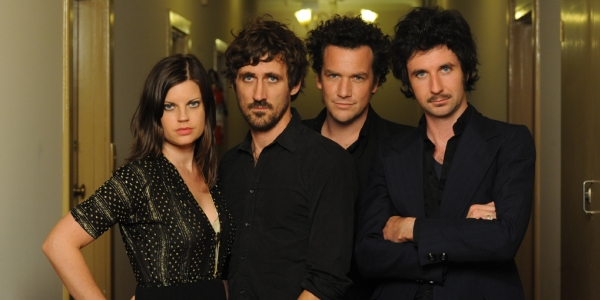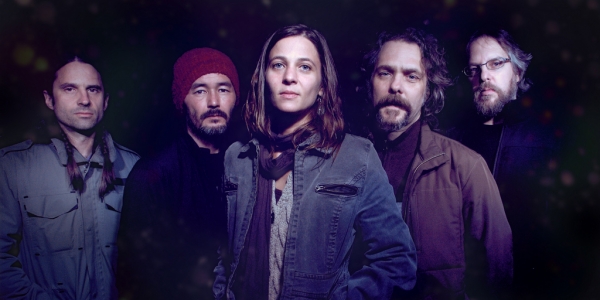Speaking from his home in Nagambie in regional Victoria, Gareth Liddiard is typically laconic when he recalls the more frenzied times of The Drones’ earlier years. “It’s not something you tire of in a sense, except maybe in hindsight. If you go on a long tour, the first week and a half is really fucking hard, and you don’t like it,” Liddiard says. “You get no sleep, and you’re always on the move. It’s like Race Around The World, but you’ve got to play gigs as well. But after a couple of weeks, something inside your brain changes, and you can just do it. You really love it, and you just become a fucking animal, and you start telling people to fuck off. You want something, and you take it, and if something’s in your way, you barge through it. But when you get home, you have to do the dishes.”
I See Seaweed is the first Drones record since 2008’s Havilah. In the intervening period, Liddiard found time to release his debut solo record, Strange Tourist. Liddiard concedes that there’s negligible difference between his solo compositions and a Drones record. “For me there’s nothing – it’s the same thing,” Liddiard says. “If I call it The Drones, and then I went out to play gigs, then people would be weirded out because The Drones weren’t there. To get a certain sound – to sound like you’ve got a band behind you – you’ve got to have a band behind you, and if you don’t want to sound like you have a band behind you, you don’t.” With his characteristic honesty and occasional caustic commentary, Liddiard critiques the entire concept of a ‘solo’ record. “I hate the word solo because: what does it mean? The dictionary meaning – ‘that was a solo record’? So although Adalita and Glenn Richards and a bunch of people put solo records out that year, but I was the only one who put a solo record out because I did it all myself. Ultimately it’s me unaccompanied, or it’s just more Drones shit. That’s the way I see it.”
While paying tribute to the influence and contribution of his Drones band mates – guitarist Dan Luscombe, bass player Fiona Kitschin and drummer Mike Noga – Liddiard concedes that he provided the prevailing artistic and production direction on I See Seaweed. That said, Liddiard doesn’t consider himself a control freak – certainly not in the manner of the more precious auteurs of yore. “Not really … but maybe to a degree,” Liddiard muses. “I don’t believe in committees – what’s that saying: a committee makes a camel, and an individual makes a racehorse. I don’t believe in committees, but I do believe that everyone has to have space to be themselves. For example with Dan, I only need to tell him what key the song is in. But I kind of have to steer the ship – it’s control, but not control freakiness.”
I See Seaweed is the first studio recording to feature the piano-playing talents of Steve Hesketh. Hesketh, whose piano skills have been embraced previously by You Am I, The Mess Hall, The Bamboos and a host of other Australian bands, had originally joined The Drones for their most recent Australian tour; it was a natural decision to invite him to join the band. “Steve did that tour we did after the DVD release. Part of that was him playing with us in that warehouse and doing a bunch of stuff that we couldn’t ordinarily do,” Liddiard says. “A piano is great thing for that – a piano can be quite bare, and it doesn’t complicate things, so it’s more useful than a synthesiser or a Hammond. And he’s awesome to have around – he’s hilarious.”
With I See Seaweed, Liddiard is again in colourful literary mode, his lyrics a pastiche of observations on historical dramas, contemporary fuck-ups and the flawed attributes of political leadership. Grey Leader, in particular, reflects Liddiard’s frustrations with those who purport to construct our political agenda. “It’s pretty general. It’s just about leaders being fuckwits – they’re all idiots, they’re all egomaniacs and they’re all hypocrites,” Liddiard says. “There is that line in the song: ‘while the big kick the small down the street’. That happens all the time. And I had Tony Abbott in mind because he’s such a douche. Whether it’s Tony Abbott or Kim Jong-il (laughs). It’s a pretty general song.”
But while Liddiard admits that every line in every one of his songs has an underlying meaning, he’s content to let the listener explore each lyric’s meaning for themselves. “They mean something to me – every line in there I could tell you what it means, but I don’t want to, because that’s for the listener,” Liddiard says. “Music’s great like that – you could be listening to something in high school, and you could listen to it this week, and because you’re older and have more experience, you’ll hear something new that you didn’t hear before. You can’t do that with books and films so much because you can’t watch or read them that many times.”
While Liddiard could never be accused of being a flag-waving nationalist, it’s arguable that The Drones is a uniquely Australian band – not just the parochial aspect of Liddiard’s lyrics, but via the sense of space that the band’s music conveys. And on A Moat You Can Stand In, The Drones create a sound that conjures up images of X, Rose Tattoo, Cold Chisel and The Radiators destroying eardrums at the Bondi Lifesaver in 1979. “We weren’t really trying to get that sound. I just wanted to get a song! If we played that song in a pub we’d get bashed. People say we sound like Oz rock or pub rock, but at the end of that song it’s so noisy that we’d be turfed out. We were going for a wild sound, that’s all,” Liddiard says.
Having travelled all over the world, Liddiard concedes he has a sense of national identity – but it’s practical, not ideological. “In the practical side of things – linguistics or sharing the same sense of humour,” Liddiard says. “You feel that when you come back from France. There are a lot of subtleties that Australians have, and that makes me feel Australian, but I’m not parochial or nationalistic. Humans come from the world, so I feel more worldly than an Aussie Oi Oi Oi!” he laughs.
On Why Write A Letter You’ll Never Send, Liddiard embarks on a 19th century letter writing experience, dictating his observations on the world at large in the manner of a long-winded stream of conscious. “The old letters were written as a stream of consciousness. They were as much about the receiver as they were about the person writing it,” Liddiard says. Though definitely not nostalgia for the past – and no letter-writer himself – Liddiard does lament the absence of subtlety and emotion in modern electronic communications. “They don’t do it with emails anymore, but they would put a bit of humour in it, throw a bit of vaudeville in there – you manipulate the reader, and you show off a little. So it was written like that. These days, that’s lost. You don’t get that anymore, which is a shame.”
With such a rich literary quality to his lyrics, it’d be easy to see Liddiard picking up the proverbial pen and composing a novel, replete with the bastards, murderers, convicts and deluded leaders who’ve found a place in his musical stories. That, however, isn’t on the horizon. “No, I just write songs – that’s my thing. I wouldn’t want to do prose or poetry if it’s not accompanied by music. It’s a specific thing unto itself, and I think I have the knack now,” Liddiard says.
In fact, there are far more pressing things to do when Liddiard and The Drones are having downtime – like mending fences – than sit around waiting for artistic inspiration. “As you get older you get busier, and you have to start compartmentalising parts of your life – whether it’s work, family, friends, music, whatever,” Liddiard says. “I’m too busy fixing a fence or an alternator, or shit like that. You’ve got to do that shit – you’ve got to live! And it’s not as sad as it sounds either – I remember reading Patti Smith when I was younger saying ‘there’s no inspiration anymore – I just work’, and I thought that was a bit dry. But it’s actually better. You learn to appreciate just what life is. It’s just the weirdest thing that ever happened.”
BY PATRICK EMERY
Photo credit: Ben Clement







